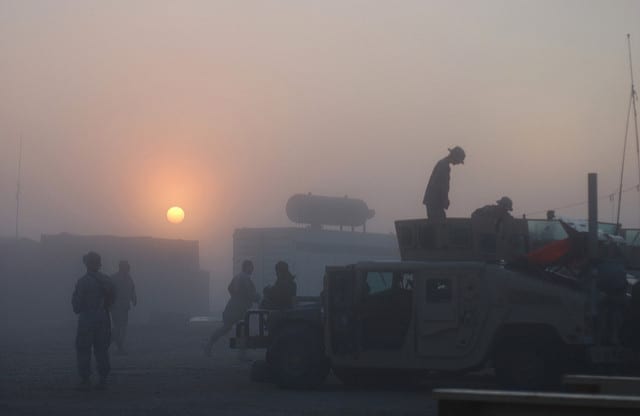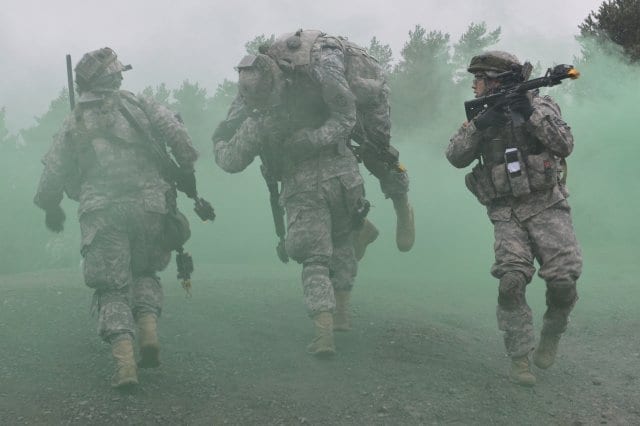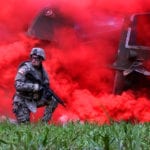The following excerpts come from Beyond Trauma by Dean Bonura.
…
Trauma Leads to Growth
This story illustrates the truth that trauma leads to emotional and spiritual growth.3 Not that long ago, clinicians typically used a disease model to understand trauma and its effects, focusing on what was wrong with the patient. But the assumptions of clinical psychology are changing from this medical model to a more positive, psychological perspective.4 More and more clinicians are advocating this perspective on trauma.5 Those who have a positive view of traumatic events seem to be less likely to report high levels of distress.6
Studies show many soldiers, particularly those who have experienced a moderate level of wartime trauma, come through their traumatic experiences with a greater sense of purpose, a deeper appreciation for life, changed priorities, and in some cases a deeper desire to walk closer to God.7
In short, trauma and the crisis it creates for people do not have to lead to a bad end. Crisis can be the catalyst for positive change, creating opportunity and the means for personal growth. In every crisis there is always an opportunity, as an old Chinese proverb goes.8
…
The Effects of Post-Traumatic Growth on Spirituality
Some studies indicate that traumatized people reported more emotional or spiritual growth than those who were not traumatized. In other words, trauma stimulated growth. Pain, more often than not, is the gateway to spiritual, mental, and emotional gain and positive change. I believe God often uses pain to get our attention and stimulate growth.
 Among the many positive changes traumatized people may experience, changes in spirituality are significant. Such changes include spiritual adjustments and new perspectives about the direction of one’s life and one’s attachment to things.14 In interviews I conducted for this book, slightly over half the respondents (16/30) reported some form of personal or spiritual growth because of their combat experience. Nine soldiers specifically stated that they became stronger, more capable of dealing with life’s demands, less stressed, and more determined because of their combat experience.15 In a survey I conducted with 165 soldiers, 54 percent believed they had become stronger because of their combat experience; 51 percent felt they could grow despite or because of their wartime trauma.16
Among the many positive changes traumatized people may experience, changes in spirituality are significant. Such changes include spiritual adjustments and new perspectives about the direction of one’s life and one’s attachment to things.14 In interviews I conducted for this book, slightly over half the respondents (16/30) reported some form of personal or spiritual growth because of their combat experience. Nine soldiers specifically stated that they became stronger, more capable of dealing with life’s demands, less stressed, and more determined because of their combat experience.15 In a survey I conducted with 165 soldiers, 54 percent believed they had become stronger because of their combat experience; 51 percent felt they could grow despite or because of their wartime trauma.16
The presence of spirituality in a person contributes to post-traumatic growth. Spiritual people respond more positively to trauma and often deepen their relationships with others because of trauma.17 They frequently attribute their spiritual growth to a relationship with God, spiritual practices, or the support of a faith community.18
In studies I did with veterans of OIF and OEF, some aspect of spirituality or growth was identified as an outcome of their wartime experience. While many stated they believed in God, many were not practicing their spirituality in any formalized setting. Some indicated problems reengaging their faith and reestablishing spiritual practices after returning home. Most felt indebted to God for preserving their lives or acknowledged the presence of a Supreme Being who was with them during combat. Most expressed an appreciation for life, their families, and the protection of God. A few who reported a vibrant faith before, during, and after combat found less difficulty with post-trauma symptoms across all ranges of combat exposure.19
…
Meaning and Understanding
 Post-traumatic spiritual growth acknowledges the presence of meaning and existential changes in suffering.24 One’s search for meaning or significance in suffering is a critical aspect of growth. When victims assign meaning to their trauma, they find healing, and healing suggests growth. It is likely that a change of perspective and an increase in understanding about a traumatic event are predictors of growth. This is implied from a study on post-traumatic growth among victims of the September 11, 2001, attacks. The findings of the study suggest that the victims of the attack who acquired a positive view were likely to experience post-traumatic growth.25
Post-traumatic spiritual growth acknowledges the presence of meaning and existential changes in suffering.24 One’s search for meaning or significance in suffering is a critical aspect of growth. When victims assign meaning to their trauma, they find healing, and healing suggests growth. It is likely that a change of perspective and an increase in understanding about a traumatic event are predictors of growth. This is implied from a study on post-traumatic growth among victims of the September 11, 2001, attacks. The findings of the study suggest that the victims of the attack who acquired a positive view were likely to experience post-traumatic growth.25
Spirituality provides the values and moral framework by which one may understand suffering. Belief in God enables a person to know God’s presence and God’s love. It gives a person a perspective that provides for lasting hope, a perspective on realities that remain certain but are not yet. Spirituality reduces anxiety about death and provides comfort in our suffering. It teaches about loss and limitations. Accepting and nurturing spirituality frees one from the burden of needing to understand everything.26
…
These excerpts pulled from Beyond Trauma by Dean Bonura.
3. Richard G. Tedeschi and Lawrence G. Calhoun, Trauma and Transformation: Growing in the Aftermath of Suffering, (Thousand Oaks, CA: Sage Publications, 1995); R. G. Tedeschi and L. G. Calhoun, “The Posttraumatic Growth Inventory: Measuring the Positive Legacy of Trauma,” Journal of Traumatic Stress 9 (1996): 455–471; A. Fontana and R. Rosenheck, “Psychological Benefits and Liabilities of Traumatic Exposure in the War Zone,” Journal of Traumatic Stress 11, no. 3 (1998): 485–503; Shira Maguen, Dawne Vogt, Lynda King, Daniel King, and Brett Litz, “Posttraumatic Growth Among Gulf War I Veterans: The Predictive Role of Deployment-related Experiences and Background Characteristics,” Journal of Loss and Trauma 11, (2006): 373–388; Park and Ai, “Meaning Making and Growth.”
4. Joseph and Linley, “Psychological Assessment.”
5. For example, see Tedeschi and Calhoun, Trauma and Transformation; Tedeschi and Calhoun, “The Posttraumatic Growth Inventory”; C. Aldwin and M. Levenson, “Posttraumatic Growth: A Developmental Perspective,” Psychological Inquiry 15 (2004); Morland et al., “Resilience.”
6. A. Mahoney et al., “Broken Vows.”
7. Maguen et al., “Posttraumatic Growth.”
8. See http://thinkexist.com/quotes/with/keyword/crisis/.
15. Bonura, “A Biblical Approach.”
16. Ibid.
17. Mahoney et al., “Broken Vows.”
18. Ibid.
19. Bonura, “A Biblical Approach.”
24. Morland et al., “Resilience.”
25. Ibid.
26. Schiraldi, The Post-Traumatic Stress.







